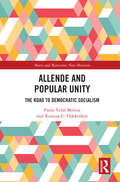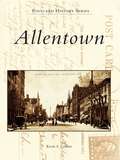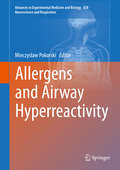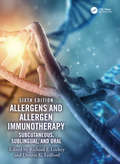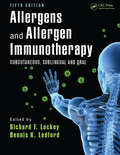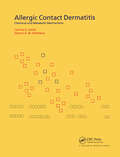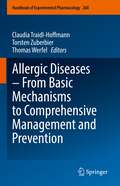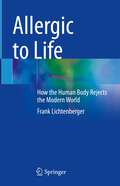- Table View
- List View
Allenby, A Study In Greatness: The Biography Of Field-Marshall Viscount Allenby Of Megiddo And Felixstowe (Allenby, A Study In Greatness #1)
by Field-Marshal Earl WavellIn this two-part biography, Field Marshal Wavell, charts the rise of the 1st Viscount Allenby, from a lowly cavalry lieutenant to the rank of Field Marshal.Allenby was commissioned into the 6th Dragoons in 1880, well-liked by his contemporaries but never considered overly talented. However under fire and in contact with the enemy during the Boer War, Allenby's talents began to come to the fore; tough and disciplined, he was rapidly promoted with each battlefield success. Afflicted by a rabid temper, which led to towering rages at subordinates, he was nicknamed "The Bull".When Europe descended into chaos and the horrors of the First World War in 1914, Allenby was given command of the only British cavalry brigade to be sent to France in 1914. The cavalry distinguished itself in the chaotic fighting of 1914, particularly at the First Battle of Ypres. As trench warfare removed any possibility of a war of movement, Allenby transferred to command of V Corps and then to lead Third Army. Allenby's tactics including frequent counterattacks led to heavy casualties would lead to his transfer to Egypt. Allenby organised, planned and executed the campaign across Egypt and the Palestine that threw the Ottoman army back all the way Aleppo before the armistice in 1918. Allenby would stay on in Egypt as High Commissioner between 1919-1925, dealing with the fluid and tricky politics of the area before his eventual retirement."Here is a piece of work well done and apt reading for the times. General Wavell is at once the pupil and successor of his great Palestine commander, and is qualified also by sobriety, detachment of view, and a gift of clear, concise writing. Three factors have combined...the skill of the very competent biographer; the crescendo of interest, culminating in one of the most brilliantly conceived victories in history, and, last and most, the rugged splendour of Allenby's character."--SIR RONALD STORRS, in The Spectator.
Allenby’s Final Triumph [Illustrated Edition]
by William Thomas MasseyIncludes the World War One In The Desert Illustration Pack- 115 photos/illustrations and 19 maps spanning the Desert campaigns 1914-1918THIS narrative, it is hoped, will serve to remove the impression which prevails among a not inconsiderable section of the British public that the Army commanded and handled with such consummate skill by Lord Allenby in Palestine had a comparatively simple task...In 1918 General Allenby had to contend with enormous difficulties. He was faced with the problem of having to arrange his operations so as to fit in with the calls made upon him to reinforce the Western Front. At a time when the Turkish moral was still good, he had to send to France the bulk of his veteran British infantry when they were in the highest state of efficiency, and, with new Indian troops in their place, he had to build up another army. In these pages I have tried to show how, while increasing the power of his fresh troops, he forced down the fighting capacity of his enemy, and then, when by a most ably worked out scheme of camouflage he had concealed scores of thousands of men and horses at the place of attack, he launched his host against an army whose moral he had reduced to a low level. By employing a magnificent body of cavalry he gave another lesson to the armies of the world in the employment of the mounted arm, and, uninfluenced by the desires of London and Paris that this or that should be his aim, his own plans, worked out in his own way, secured far more than War Councils or War Cabinets had any right to expect. The Army's appreciation of Lord Allenby is correct.
Allende and Popular Unity: The Road to Democratic Socialism (Marx and Marxisms)
by Paula Vidal Molina Ximena U. OdekerkenThis book is a fascinating collection of carefully handpicked key texts and speeches from Chile’s 1,000 Days of Revolution, previously unpublished in English. Twenty-three texts embodying the activity of Unidad Popular and Salvador Allende’s government in the early 1970s are structured around five thematic sections, which tell the story of the common challenges for progressive political organizations and social movements today. The themes of participatory democracy and sovereignty, economy and social rights, women and gender equality, indigenous people, and worker-class syndicalism and political organization guide the reader through the multidimensional and global vision of Popular Unity’s socialist project. Ideal for students, scholars, and general readers, this book introduces an extraordinary period in Chile’s history to a new generation of readers interested in the resurgence of democratic socialism around the world.
Allende's Chile and the Inter-American Cold War
by Tanya HarmerFidel Castro described Salvador Allende's democratic election as president of Chile in 1970 as the most important revolutionary triumph in Latin America after the Cuban revolution. Yet celebrations were short lived. In Washington, the Nixon administration vowed to destroy Allende's left-wing government while Chilean opposition forces mobilized against him. The result was a battle for Chile that ended in 1973 with a right-wing military coup and a brutal dictatorship lasting nearly twenty years. Tanya Harmer argues that this battle was part of a dynamic inter-American Cold War struggle to determine Latin America's future, shaped more by the contest between Cuba, Chile, the United States, and Brazil than by a conflict between Moscow and Washington. Drawing on firsthand interviews and recently declassified documents from archives in North America, Europe, and South America--including Chile's Foreign Ministry Archive--Harmer provides the most comprehensive account to date of Cuban involvement in Latin America in the early 1970s, Chilean foreign relations during Allende's presidency, Brazil's support for counterrevolution in the Southern Cone, and the Nixon administration's Latin American policies. The Cold War in the Americas, Harmer reveals, is best understood as a multidimensional struggle, involving peoples and ideas from across the hemisphere.
Allentown (Postcard History Series)
by Kevin S. GildnerAllentown is many things to many different people. It is a historical city, a city of churches, a city of immigrants, and a place that values hard work, education, and recreation. This is a city with rich and unique stories to tell. Allentown captures historical stories such as the hiding of the Liberty Bell, early railroad and canal transportation, and the training of World War I ambulance drivers. Other stories include how politics influenced the building of a world-class park system. This rare collection of postcards depicts how the people of Allentown shaped the city into their idea of the American dream.
Allentown Materials Corp.: The Electronic Products Division (A)
by Michael BeerA division of Allentown Materials Corp. has financial and organizational problems. Conflict and lack of coordination exist between functional groups. Employees do not have a sense of direction, and morale is low. The cause of these problems is found in a change in business environment followed by changes in organization and management. A rewritten version of an earlier case.
Allentown Materials Corp.: The Electronic Products Division (B)
by Michael BeerFocuses on the recommendations and implementation strategy made by the organizational development group to address the division's problems. A rewritten version of an earlier case.
Allentown Materials Corp.: The Electronic Products Division (C)
by Michael BeerSupplements the (A) and (B) cases. Designed as an in-class handout. A rewritten version of an earlier supplement.
Allentown State Hospital (Images of America)
by Steven RoyerAllentown State Hospital, formerly known as the Homoeopathic State Hospital for the Insane at Allentown, was the first homeopathic state hospital for the treatment of the mentally ill in Pennsylvania. On October 3, 1912, under the direction of its superintendent, Dr. Henry I. Klopp, the hospital opened its doors to receiving patients. In 1930, Dr. Klopp opened a children's ward on the hospital's grounds, one of the first of its kind in the world. Built to alleviate overcrowding in the state mental health system, the hospital quickly exceeded its own occupancy. By 1954, the population of the hospital hit its peak of 2,107 patients. However, Allentown State Hospital would consistently pioneer change in the mental health system until its closure in 2010. In 1993, a dedicated group of employees created the Psychiatric Emergency Response Team (PERT) process to provide a safer response to supporting patients in crisis. By 1998, this approach helped put the spotlight on Allentown State Hospital when it became the first hospital in the United States to go seclusion free.
Aller Retour New York: Essay (New Directions Revived Modern Classics)
by Henry MillerAller Retour New York is truly vintage Henry Miller, written during his most creative period, between Tropic of Cancer (1934) and Tropic of Capricorn (1939). Aller Retour New York is truly vintage Henry Miller, written during his most creative period, between Tropic of Cancer (1934) and Tropic of Capricorn (1939). Miller always said that his best writing was in his letters, and this unbuttoned missive to his friend Alfred Perles is not only his longest (nearly 80 pages!) but his best--an exuberant, rambling, episodic, humorous account of his visit to New York in 1935 and return to Europe aboard a Dutch ship. Despite its high repute among Miller devotees, Aller Retour New York has never been easy to find. It was first brought out in Paris in 1935 in a limited edition, and a second edition, "Printed for Private Circulation Only," was issued in the United States ten years later. It is now available in paperback as a Revived Modern Classic, with an introduction by George Wickes that illuminates the people and personal circumstances which inform Aller Retour New York.
Allergen Management in the Food Industry
by Joyce I. Boye Samuel Benrejeb GodefroyThis book comprehensively addresses the sources of allergenic contaminants in foods, their fate during processing, and the specific measures that need to be taken to minimize their occurrence in foods. The book provides up-to-date information on the nine major allergens (as well as other emerging allergens) and practical guidelines on how these allergens can be identified and controlled during production and processing. Starting with an introduction to food allergens, the book follows with sections on food allergen management during production and processing, guidelines for the processing of specific allergen-free foods, techniques for hypo-allergenization and allergen detection, and allergen-free certification.
Allergen-Free Baker's Handbook: 100 Vegan Recipes [A Baking Book]
by Cybele PascalFree to Eat Sweets!The number of people with food allergies is skyrocketing, leaving puzzled cooks and anxious parents eager to find recipes for "normal" foods that are both safe and delicious. The Allergen-Free Baker's Handbook features 100 tried-and-true recipes that are completely free of all ingredients responsible for 90 percent of food allergies, sparing bakers the all-too-common frustration of having to make unsatisfactory substitutions or rework recipes entirely. To make things even easier, energized and empathetic mom Cybele Pascal demystifies alternative foodstuffs and offers an insider's advice about choosing safe products and sources for buying them. As the head baker for a food-allergic family, food writer Pascal shares her most in-demand treats and how to make them work without allergenic ingredients. Her collection includes a delightfully familiar array of sweets and savory goodies that are no longer off-limits, from Glazed Vanilla Scones, Cinnamon Rolls, and Lemon-Lime Squares to Chocolate Fudge Brownies, Red Velvet Cake, and every kid's favorite: Pizza. In addition to being a lifeline for people with food allergies, sensitivities, and intolerances, these entirely vegan recipes are perfect for anyone looking to avoid artificial and refined ingredients, and those interested in baking with healthful new gluten-free flours such as quinoa, sorghum, and amaranth. Best of all, Pascal has fine-tuned each recipe to please the palates of the most exacting critics: her young sons. Lennon and Monte like these tasty treats even better than their traditional counterparts, and you will too!From the Trade Paperback edition.
Allergen-Free Desserts to Delight Your Taste Buds: A Book for Parents and Kids
by Amanda OrlandoBake sales are a fun and tasty tradition at elementary schools all over, but not necessarily so for kids who have food allergies. Usually restricted to the baked goods prepared by their parents, allergic kids are not able to fully enjoy the ritual of lining up single file and marching over to the bake sale, tables lined with proud moms and delicious treats. Birthday parties and classroom parties are a similar story. Oftentimes, children with allergies will feel left out of the experience because they cannot fully or as freely participate or interact in social situations involving food. When one of the highlights of a party is the big birthday cake or the table of treats, it is hard for kids who are allergic to those things to get excited or feel included. Luckily for these children, Allergen-Free Desserts That Will Fool Your Taste Buds is here, providing such delicious treats as: * Chocolate chip cookie dough ice cream * Mango sorbet * Banana bread * Marble pound cake * Spicy shortbread cookies * Gingerbread cookies * Classic vanilla cupcakes * And many more! With treats so tasty that even children without allergies will flock to them, your allergy-afflicted child will never feel left out again.
Allergen-Free Family Cookbook: Gluten-Free, Dairy-Free, Casein-Free, Soy-Free, and Nut-Free Recipes
by Erica DanielsA mother's love letter to her son—featuring more than sixty gluten-, dairy-, soy-, casein-, and nut-free recipes. A portion of proceeds from the sale of this book will be donated to autism research. This heartfelt cookbook tells the story of a mother desperate to heal and connect with her hard-to-reach, severely autistic son, Leo, through the most vital everyday activity—cooking. For many years, Erica Daniels had been out to find a successful dietary intervention for eleven-year-old Leo, who suffers from significant food allergies, gastrointestinal disease, and autism. Through trial and error in her own kitchen, she finally hit her gastronomic stride of preparing nourishing meals for her entire family without gluten, dairy, soy, nuts, additives, or GMOS—with Leo by her side. Part cookbook and part love story, Cooking with Leo takes you into the real life messy kitchen of a family affected by autism and food allergies. You will laugh and cry along with Erica and Leo as they cook, create, dance, act silly, and, most importantly, bond. A family-inspired collection of over 60 allergen-free and autism diet–friendly recipes to be prepared and shared together by your whole family, you will make meaningful connections with your child and nurture their passion for cooking with nutritious recipes such as: Teff-Tough Honey WafflesFootball Sunday Turkey ChiliGrandma's Healing Chicken SoupLeo's Italian ArtichokesNanny's Rhubarb SauceYouTube Organic Gummy Candies, and more! Learn not only to cook nutritiously for your whole family, but also to connect with your children, find their gifts and develop their strengths, impart life skills, and tie the family together with healthy food and happy guts.
Allergenic Pollen: A Review of the Production, Release, Distribution and Health Impacts
by Mikhail Sofiev Karl-Christian BergmannThis is the first book to summarize all aspects of allergenic pollen: production, atmospheric distribution, and health impacts, as well as the means of monitoring and forecasting these phenomena. Based on a four-year effort by a large group of leading European scientists, this book highlights the new developments in research on allergenic pollen, including the modelling prospects and effects of climate change. The multidisciplinary team of authors offers insights into the latest technology of detection of pollen and its allergenic properties, forecasting methods, and the influence of allergenic pollen on the population. The comprehensive coverage in this book makes it an indispensible volume for anyone dealing with allergenic pollen worldwide. Readers involved in environmental health, aerobiology, medicine, and plant science will find this book of interest.
Allergens and Airway Hyperreactivity (Advances in Experimental Medicine and Biology #838)
by Mieczyslaw PokorskiRespiratory allergy is constantly encountered and is sharply on the rise, particularly in the two most vulnerable age-groups: young children and seniors. Allergy results in airway hyperactivity and increased airway resistance, with all inflammatory sequelae being ensued. The chapters show how respiratory allergy research is interconnected with other disciplines by discussing neurotransmitter, membrane receptor, and ionic channel mechanisms of allergy and by giving diagnostic and pharmacological cues on desensitization and therapy.
Allergens and Allergen Immunotherapy: Subcutaneous, Sublingual, and Oral
by Richard F. LockeyThe sixth edition of Lockey and Ledford's Allergens and Allergen Immunotherapy continues to provide comprehensive coverage of all types of allergens and allergen vaccines, providing clinicians the essential information they need to accurately diagnose and manage all allergic conditions. With new and updated chapters, the sixth edition is the most up-to-date, single resource on allergy and immunotherapy. Key Features Completely revised and updated Detailed single source reference on allergy and immunotherapy Reorganized to provide clinicians with essential information to make diagnoses and offer the best treatments
Allergens and Allergen Immunotherapy: Subcutaneous, Sublingual, and Oral, Fifth Edition (Clinical Allergy And Immunology Ser. #Vol. 21)
by Dennis Ledford Richard LockeyThis fifth edition of the bestselling Allergens and Allergen Immunotherapy is now completely updated and revised to include subcutaneous, sublingual, and oral immunomodulator treatments of allergic disease.The redesigned book continues to provide comprehensive coverage of all types of allergens and allergen vaccines, giving clinicians the essential
Allergic Contact Dermatitis: Chemical and Metabolic Mechanisms
by Camilla Smithllergic Contact Dermatitis assesses the potential effects of xenobiotic metabolism and protein reactivity on toxicity. It reviews current knowledge of percutaneous absorption and skin metabolism and includes discussion of the xenobiotics themselves. It answers questions such as: How does sensitisation relate to protein reactivity and levels of metabolism? How we can identify potential hazards in food, cosmetics and pharmaceuticals etc? In a world where people are becoming increasingly aware of their allergies, this up to date one-stop reference will prove an invaluable addition to the shelves of any researcher in academia, government, regulatory bodies, public health officials and, of course, the food, cosmetics and pharmaceuticals industries will find the book to be of particular relevance.
Allergic Diseases – From Basic Mechanisms to Comprehensive Management and Prevention (Handbook of Experimental Pharmacology #268)
by Torsten Zuberbier Thomas Werfel Claudia Traidl-HoffmannAllergy is the most frequent chronic disease in the 21st century having severe negative effects on health and the economy. The challenge we therefore face in medicine and science incorporates all areas of society – from politics to food industry, from schools to city planning, and many more. This volume informs the reader about continuously ongoing developments in allergy research and their implications for society. The chapter sections cover the immunological mechanisms in allergy on a molecular level, describe the triggers and cures for allergy in detail, entail clinical translation of lab findings on allergens, evaluate diagnostics for allergy markers, and provide solutions for future medical intervention or preventive strategies. Laboratory research, bioinformatics, climate modelling, patient treatment, intervention studies, epigenetics and multiple other disciplines are able to shed new light on this revolutionary field of healthcare.
Allergic Intimacies: Food, Disability, Desire, and Risk
by Michael GillThe first book to explore food allergies in the United States from the perspective of disability and raceAre food allergies disabilities? What structures and systems ensure the survival of some with food allergies and not others? Allergic Intimacies is a groundbreaking critical engagement with food allergies in their cultural representations, advocacy, law, and stories about personal experiences from a disability studies perspective. Author Michael Gill questions the predominantly individualized medical approaches to food allergies, pointing out that these approaches are particularly problematic where allergy testing and treatments are expensive, inconsistent, and inaccessible for many people of color.This thought-provoking book explores the multiple meanings of food allergies and eating in the United States, demonstrating how much more is at stake than we realize, at a critical time when food allergies are on the rise: An estimated 32 million Americans, including one in thirteen children, have food allergies. Diagnoses of food allergies in children have increased by 50 percent since 1997. Yet as the author makes clear, the whiteness of the food allergy community and single-identity disability theory is inherently limiting and insufficient to address the complex choices that those with food allergies make. Gill argues that racism and ableism create unique precarity for disabled people of color that food allergic communities are only beginning to address. There is a huge disparity in access to testing and treatment, with African American and Latinx children having higher risk of adverse outcomes than white children, including more rates of anaphylaxis. Food allergy professionals have a responsibility to move beyond individualized approaches to more robust coalitional efforts grounded in disability and racial justice to undo these patterns of exclusion.Allergic Intimacies celebrates the various creative ways food allergic communities are challenging historical and current practice of exclusion, while identifying the depth of work that still needs to be done to shift focus from a white allergic experience toward a more representative understanding of the racial, ethnic, religious, and economic diversity of those in the United States. Gill’s book is a discerning and vital exploration of the key debates about risks, dangers, safety, representations, and political concerns affecting the lives of individuals with food allergies.
Allergic To Pets?
by Shirlee KalstoneAvoid Allergic Outbreaks–Not Animals!Allergic to Pets?addresses the problem that plagues allergic animal lovers everywhere: how to live with a pet you love when you (or a family member) are allergic to it. Sensitivity to animals is one of the most frequently diagnosed allergies–yet until now, allergic animal lovers have been faced with only two choices: give up their beloved pets or live with the suffering. Finally help is here!Allergic to Pets?is the first book to provide effective advice for cohabiting with cats, dogs, small furry pets, birds, and even horses. Renowned pet expert Shirlee Kalstone explains: • What causes an allergic reaction and how to ward off the worst of it • How to care for your hairy, furry, and feathered pets (and their environments) to minimize allergens • A room-by-room guide to allergen-proofing your home • When to get professional assistance: medicines for the sufferer as well as nontoxic allergen-reducing products formulated specifically for animals And much more! Allergic to Pets?is an indispensable resource for animal-loving allergy sufferers everywhere, packed with much-needed advice, explanations, and helpful tips. From the Trade Paperback edition.
Allergic to Death
by Peg CochranPreparing calorie-conscious meals for the dieters of Woodstone, Connecticut, Gigi Fitzgerald knows a cheater when she sees one. And when murder is on the menu, she's ready to get the skinny on whodunit... Business is looking up for Gigi's Gourmet De-Lite, thanks to her newest client, restaurant reviewer Martha Bernhardt. Martha has the clout to put Gigi's personal meal plans on everyone's lips. But instead of dropping a few pounds, Martha drops dead from a severe peanut allergy...right after eating one of Gigi's signature dishes. When the distractingly debonair Detective Mertz identifies traces of peanut oil in Martha's last meal, Gigi suddenly finds her diet catering business on the chopping block. Now she'll have to track down who tampered with her recipe before her own goose is cooked. Includes delicious--and healthy--recipes!
Allergic to Life: How the Human Body Rejects the Modern World
by Frank LichtenbergerThis easy-to-read title provides a comprehensive discussion of the major changes in daily life that have led to states of increased bodily inflammation. Indeed, today there is an epidemic of allergic and autoimmune disease in the first and developing world. While outdoor climate change is now considered common knowledge, the impact of longer work hours, artificial lighting, increased food shelf life, and changes to the microbiome all have made a large impact in increasing allergies worldwide. An allergy, best defined as a “damaging response from the Immune system due to a substance in the environment,” starts with warning signals, or generalized "symptoms," that are caused by something in the environment. Itching, aches, pains, swelling, coughing, and fatigue are all immune responses. Written in an engaging -- and often humorous -- style by an allergist/immunologist, the first three chapters outline how the human body is in an unquestionably harmful environment, and that, in general, the immune system is just doing its job. In subsequent chapters, the specific topics contributing to allergies are covered in detail, starting with microorganisms and a focus on indoor living. Dust mites, for example, are addressed in one full chapter -- and for good reason. The past few decades have seen an explosion of climate controlled, humidified indoor airspace that is ideally suited for more mass production of mites.In the end, emphasizes the author, all roads of inflammation from the environment lead to the “mast cell compartment.” The stress responses of the body summarily drive up this compartment and have led to a world-wide prevalence of between 14% to 17% of “mast cell activation syndrome.” While genetics and comorbid conditions are important in any symptom or disease process, the mast cell compartment feeds and grows off all the major environmental changes of the past 50 or so years. This is why the human body in the 21st century is in a low level state of “rejection,” of the world, says the author. Most of these changes are irreversible, but the situation is not hopeless. Understanding how the body changes itself in response to its environment will allow controlled desensitization to the environment. Allergic to Life: How the Human Body Rejects the Modern World serves as a concise and lively text for clinicians and general readers interested in a deep, expert dive into the world of allergy and immunology.
Allergic to My Family
by Liza KetchumWhen Rosie Maxwell, age nine, discovers her family will soon expand from five kids to six, she explodes. "No one has that many kids anymore!" After Clara is born, Rosie's parents are too busy to notice that the family is crazier than ever: Silas, age four, can't talk, even though his twin sister Katie always knows what he wants. Dan, the family bookworm, has a habit of disappearing. Bossy Shirley lives on the phone, even in a crisis, and Clara can't do much except cry and mess her diaper. Clearly, it's up to Rosie to fix things but somehow, all her efforts make matters worse. Then a brush fire roars into Copper Canyon, threatening the Maxwell's home. That's when everyone learns to appreciate Rosie's spunk, imagination, and gift for gymnastics--and when Rosie, now a hero, discovers she fits into her unusual family after all.In its starred review of Allergic to My Family, Kirkus Reviews wrote: "[Ketchum] deftly builds a consistent picture of this entire lively family in three amusing, self-contained episodes, then tells a satisfyingly suspenseful story about how her well-established characters cope with the fire. Welcome, Maxwells! Come back soon." "Rosie is a spirited and funny heroine, and her antics are completely believable," Booklist wrote. "[Ketchum] has captured the injured and indignant feelings of a harassed nine-year-old with great sympathy and humor. Rosie is sure to be popular with preteen readers." And indeed, as one enthusiastic teen wrote to the author, "I wish you would write another book about Rosie. I think it would help a lot of preteen girls with their lives."


